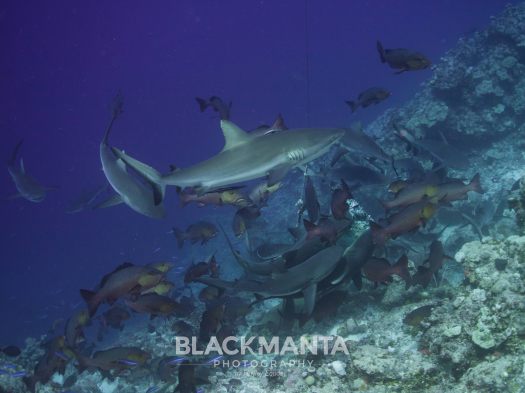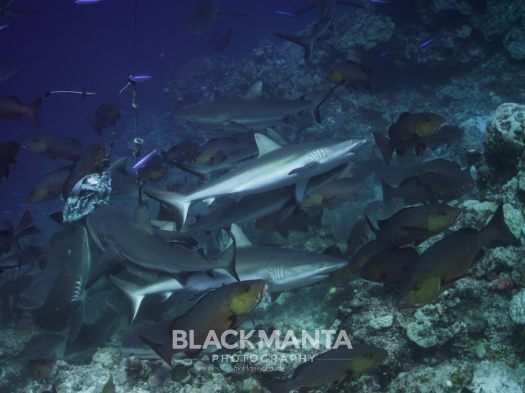We’ve recently returned from an incredible trip diving the waters of Truk Lagoon. Undoubtedly a wreck heaven, where unexpectedly we also got the chance to take part in a baited shark dive on the outer reef of the lagoon. Black tips and grey reef sharks by the dozen turned up for the feeding frenzy, with a special appearance from a rather large silver tip who (literally) stole the show at the end.
This was our first ever baited dive with sharks and got me thinking about shark dives in general and the practice of baiting.
There’s no doubt about it – a live shark is a billion times better than a dead shark. Without them, the marine ecosystem would collapse and coral reefs would slowly die off which would be an absolute travesty for the human race.
While coral reefs only cover 0.0025 percent of the ocean floor, they generate half of Earth’s oxygen and absorb nearly one-third of the carbon dioxide generated from burning fossil fuels.
A report by the United Nation’s FAO (Food and Agriculture Organisation) shows that coral reefs are responsible for producing 17% of all globally consumed protein, with that ratio being 70% or greater in island and coastal countries like those of Micronesia.
By May 2017, Earth had lost nearly half of its coral, and oceanic warming only continues to accelerate (Maybe this is grounds for a future article – let’s get back to the sharks…).
Information sourced from the GCCM – find out more on the risks faced by coral reefs here.
Any shark lover out there will be able to tell you the well-known stats that over 100 million sharks are killed each year (an incredible 11,500 per hour!), mainly for their fins or through bycatch. We also know that approx 10 people are killed each year by sharks worldwide – to put this into context, around 2,900 people are killed each year by the glorious Hippopotamus.
There is far more exposure to the plight of sharks these days than ever before, and in recent years the battle against shark finning for the shark-fin soup trade has received a much higher profile.
Has the tide turned? Will we see a decrease in the murder of these mighty pelagic creatures?
Who knows, but anything to reduce the slaughter is a good thing.
For me, the drive to educate fishermen to realise that a shark fin from a dead shark is a one time payout, while live sharks can make repeat paydays through tourism and scuba diving must become more prevalent – but how do you ensure the paying punters lined up with their camera get the shot they dream of?
Easy – you chum the water, and bait the sharks of course!
Now, this I’m sure is seen as a very contentious issue with camps on either side when it comes to the morals of this practice. I will do my best to see this from both sides.
Of the c10 deaths from shark attacks each year, I’m not aware of any of these deaths taking place through the practice of baiting sharks. Maybe because the processes in place are super stringent, but I don’t have any figures to hand to say either way.

What are the Cons? Why shouldn’t we bait sharks?
Some could argue that a healthy reef provides enough food for the entire eco-system in place. Don’t mess with Mother Nature by encouraging sharks to behave in a way that is unnatural, as distracting sharks from their natural food source and behaviours has an adverse effect on fish numbers.
Another way to think it is that we are essentially training sharks to respond to food – human interaction then becomes associated with free food. We saw this with our very own eyes when the sharks responded to the noise of the boat engines while we got into position – they were already heading towards the back of the boat before any chum had even appeared, just like the way you train a dog to respond to a ‘clicker’. This is shown in the above video at around 25 seconds into the film.
The baited dive itself was set close to the main reef where a pulley system was set up, dragging down a large frozen block of frozen fish remains as a large lift bag was inflated. Interestingly the sharks were seemingly waiting at the exact location the bait would land all jostling for the best location. Clearly it’s not just man’s best friend that can learn new tricks!
Sharks are apex predators and don’t typically share territory. Being at the top of the food chain results in lower numbers than other animals in the ecosystem, so competition isn’t always welcome.
There is also the controversial practice of cage diving, predominantly with Great Whites – controversy hitting an all-time high in the waters of Guadalupe in October 2016 when a baited dive caused a charging Great White Shark to become trapped in the cage that the diver was in. The ensuing video footage of the incident saw the shark thrash around in a desperate attempt to free itself, in the end successful but certainly raised a few eyebrows!
While chumming and baiting for sharks is legal, there are restrictions in place to promote protecting the safety of the sharks and divers sharing the water. It is assumed that the restricted practice of ‘shark wrangling’ was used in this event – the process of throwing in a severed Tuna head tied to a rope, and dragging it towards the cage as the shark approaches – as clearly shown in this image that was produced by the BIOSPHERE RESERVE OF GUADALUPE ISLAND, MEXICO this practice is a no no.

What are the Pros? Why should we bait for sharks?
As a self-obsessed shark fanatic, I want to see them in their natural habit as often as possible, and as such I’ve been really lucky over the past few years to dive up close with a varied list including Bull, Thresher, Whale, Hammerhead, Silky, Oceanic White Tip, and a whole host of different coloured tip and reef sharks.
Some of the locations are famous for sightings, but even though you expect to see the sharks, there is no guarantee they will hang around for long and that at times can be the anxiety when spending large sums on an overseas trip.
I honestly hadn’t expected to see sharks in Truk – yes I know that Micronesia has a huge shark population, but I think I was so focused on what rust I would find that I discounted the trip of any significant marine life.
I was totally fascinated by the whole set up. The professionalism of the briefing, the positioning of us, the divers, and the guides/crew in the water was perfect – even the equipment in place to bring the bait down into location so quickly.
As a diver taking part on my first baited shark dive I was over the moon with what we saw – to see an apex predator tear apart a lump of meat a few metres in front of me was just fascinating, and at no time did I feel unsafe or at risk.
I’m going to raise my earlier point on the ongoing revenue a live shark can produce. You could argue that thousands of divers descending onto shark hot-spots has a real detrimental effect on the ocean/reef/sharks, however, I believe that tourism is key for so many developing countries and having the draw for scuba divers to visit far away lands brings more to their economy than just the boat operators.
The finning of sharks can’t continue the way it is, so I’m all for seeing baited shark dives taking precedent over these actions – far more people would benefit from this for sure.

Baiting for sharks also allows divers to actually see the sharks, and in many occasions allows studies to take place in a safe environment – I mean, the chances of diving with a Great White without a cage and non baited are fairly slim. Yeah, you could get lucky, but is it going to hang around – probably not, and that is why you bait the water and sit in a cage.
Undoubtedly, awareness and conservation efforts have increased over the past 20 odd years, and it has to be said that baited and cage dives with sharks around the world have done some good. There are now shark ambassadors around the world that are doing great things in educating people with out of date and misleading views that sharks are dangerous.
Having now taken part in our first baited dive with sharks, we would absolutely do it again – we were with a professional set up, where briefings were clear and safety paramount. Just do your homework before you set off.
Any opportunity that gives those with a love and passion for these great creatures the chance to see them up close, and in a safe environment gets a massive tick from me!!


Well said Richard. While I’m against any intrusive interaction with the underwater wildlife. I agree that baiting sharks is the far better option and education of the people will go a long way to help the shark s survive for the good of the oceans and ultimately us.
LikeLiked by 1 person
Thanks for taking the time to comment Tony – it’s very appreciated.
LikeLike
We do it slightly differently here in South Africa along the eastern Coast, you drift in Blue water around a bait stem which emits a smell but doesn’t allow any foods to the sharks. The interactions are amazing and it has certainly helped dispel some of the myths about these animals for many divers and non divers alike.
LikeLiked by 1 person
Thanks for the comment Ivan. This method sounds ideal – would love to come and experience it sometime! Do you a website or social media channel where we can view the sort of marine life you are attracting?
LikeLike
Hi, check out http://www.thesardinerun.co.za and you can see what we get up to here
LikeLiked by 1 person
Interested in your comment:
“I believe that tourism is key for so many developing countries and having the draw for scuba divers to visit far away lands brings more to their economy than just the boat operators”
While I also believe that tourism can be good for developing countries (only if stringent laws are put in place), I am not so sure that the local Chuukese economy benefits much from the dive industry – The industry is pretty much cornered by 2 operators, and often divers are advised not to leave resorts due to security issues in the town. As most groups stay for a week or so, this warning ensures that the operators pocket a large portion of any spending dive groups may make on the island. Rich pickings for the few, and some jobs for the service industry.
LikeLike